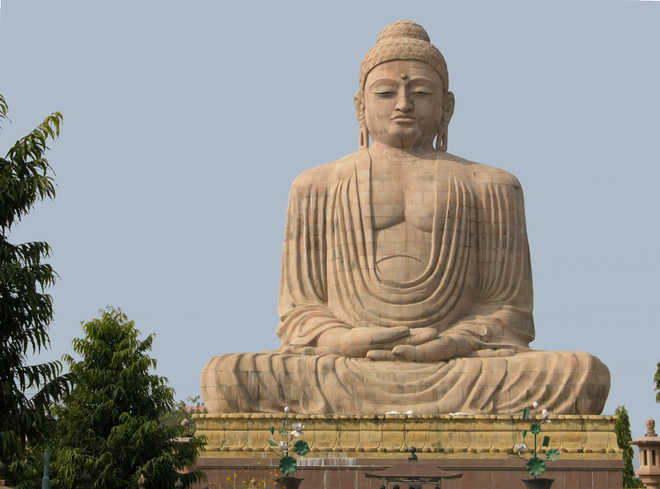
The importance of violence: The book shatters the myth that non-violence was embedded in Indian tradition and culture. The author says even followers of Buddhism and Jainism, the two ancient religions that preached non-violence, recognised the need of force as one of the necessary dharmas of the king
Harish Khare
FROM early stages of civilisation to the present times violence, or threat of violence, has always been deployed in almost political systems all over the world to sustain its order. Upinder Singh, a distinguished scholar and historian of ancient India, has produced this impressive treatise to remind us that we can easily trace our present-day organised experiments in intimidation, coercion, assault to an ancient past, when violence was central to statecraft.
There is not much disagreement that ancient India had a fairly evolved state order, with its own intellectual traditions, comparable to similar examples from Persia, China and Greece.
In our popular memory, three great ideologues of non-violence — Mahavira, Buddha and Ashoka remain defining mascots of a glorious past. But, as Professor Singh puts it: "Violence jostles with piety in the political narratives," be it the Buddhist or Jaina texts or the Brahmanical Puranas.
Yet, it certainly is not her argument that the state order in ancient India was a wanton arrangement in rampant violence. It was a sophisticated, orderly, regulated use of violence, all designed to put down forces of disorder and chaos. The ancient state claimed — as does its present day successor nation-state — a monopoly over means of violence and coercion, and this monopoly was justified, legitimised, by a received ideology.
Of course, successions were often violent; assassination, patricide and people's revolt were not unheard of; some kings were cruel and had large armies to intimidate the rivals, and conquer the forest. The Vedic texts speak of "extensive conquest, political paramountcy, and empire."
Singh gives us a fairly good idea of the political economy of the ancient state. The king's power was not absolute, nor was he a despot; instead, he was obliged to undertake rites and rituals to keep renewing the sanctity of his regime. Since it was a righteous state, use of violence, too, needed to be justified.
Ashoka, in particular, made it quite complicated. He insisted on "courtesy towards slaves and servants", prompting the historian to suggest that Ashoka was "a political prophet of soteriological socialism."
Singh keeps her eye on the 'violence' ball. "The Mahabharata is pervaded by relentless violence." Kautaliya's Arthashastra meditates on the need for the use of carefully calculated force and violence by the state against its subjects. Intrigue is also necessary because: "A king can protect his kingdom only when he is himself protected from those close to him and from his enemies, first, of all, from his wives and sons." We can almost hear Comrade Beria whispering something similar in Joseph Stalin's ears.
Arthashastra, Manusmriti, Buddhist texts matter-of-factly prescribe stern use of violence. The Jatakas speak of "...good king protects his people, is truthful and just, and preaches and practices compassion towards all creatures" yet "...sometime a great king has to sternly threaten violence."
Yes, "violence is inherent in the state," still it was not a licentious resort to coercion. Moreover, it was necessary — in very familiar modern-age Gramscian notions of hegemony-to find justifications for the use of state violence, to make it ritualised, a seamless part of a 'normal' arrangement between the ruler and the ruled. "We have seen the connection between the growth and systemisation of state violence and increasingly sophisticated attempts to mask, invisibilize, justify, and aestheticise it in various ways," Professor Singh returns again and again to this "steady invisibilising and justification of political violence."
A rather large cast of supporting actors was, understandably, necessary to undertake this "invisibilising" of violence. There were "traders, diplomats, pilgrims, professionals, immigrants, artists, and soldiers among the agents of transmissions of texts, artefacts, and ideas"... but the most influential were the "intellectuals and religious elites who brought prestigious expertise and texts to royal courts."
Yet — and this is where Singh makes us sit up again — the king was not absolute: "...doors were not completely closed to questioning, critique, dissent and doubt..."
There was this "dharma view of kingship" which placed strong emphasis on the king's duties and he had to "deliver justice, protecting the people, and preventing the onset of matsyu-nyaya — the social chaos arising from the strong preying on the weak."
This is pretty persuasive stuff from the learned scholar. And, only in this ancient context of violence we begin to appreciate the enormity of the Gandhi-Nehru undertaking. The ancient land had to be de-weaned from its addiction to an idiom of violence. The Mahatma's insistence on ahimsa ran against our civilisational grain; and, so was Nehru's crafting of a liberalism with its accent of accountable power, constrained authority, and democratic tolerance of dissent. It is a chilling thought that perhaps our current respectful insistence on the Constitution and its democracy has very little cultural sanction. May be the ancient debate over the nature of state violence —so lucidly delineated by Professor Singh — is far from over. Otherwise, we shall not be keeping Professor Sai Baba in jail.



























